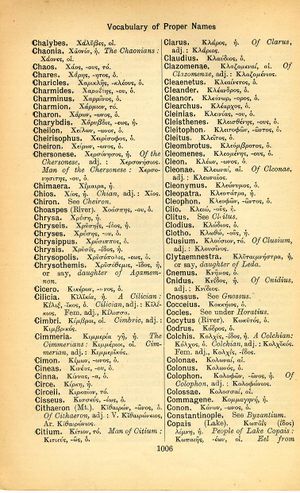Cineas: Difference between revisions
ἐπέμψατε ἀγγέλους τοῖς ἀλλήλοις ὥστε ἔγνωτε τὸν κίνδυνον → you sent messengers to one another so that you knew the danger
m (Text replacement - "link={{" to "link={{") |
m (Text replacement - "}}]]" to "}}]]") |
||
| Line 1: | Line 1: | ||
{{WoodhouseENELnames | {{WoodhouseENELnames | ||
|Text=[[File:woodhouse_1006.jpg|thumb | |Text=[[File:woodhouse_1006.jpg|thumb | ||
|link={{filepath:woodhouse_1006.jpg | |link={{filepath:woodhouse_1006.jpg}}]]Κινέας, -ου, ὁ. | ||
}} | }} | ||
{{Lewis | {{Lewis | ||
Revision as of 10:09, 15 August 2017
English > Greek (Woodhouse)
Κινέας, -ου, ὁ.
Latin > English (Lewis & Short)
Cīnĕas: ae, m., = Κινέας,
I the friend of king Pyrrhus of Epirus, who counselled him to make peace with the Romans, he is said to have had a remarkably retentive memory, Cic. Tusc. 1, 24, 59; id. Sen. 13, 43; id. Fam 9, 25, 1; Plin. 7, 24, 24, § 88; 14, 1, 3, § 12; Sen. Contr 1, prooem. p. 65 Bip.
Latin > French (Gaffiot 2016)
Cīnĕās,¹⁶ æ, m. (Κινέας), ambassadeur de Pyrrhus : Cic. Tusc. 1, 59.
Latin > German (Georges)
Cīneās, ae, m. (Κίνέας), ein Thessalier, Freund u. Diener des Pyrrhus, Königs von Epirus, Anhänger der epikurëischen Philosophie, Nachahmer des Demosthenes in der Beredsamkeit, auch Schriftsteller über das Kriegswesen, Cic. Tusc. 1, 59; ep. 9, 25, 1.

